
Maria Theresa was ruler of the Habsburg dominions from 1740 until her death in 1780, and the only woman to hold the position suo jure. She was the sovereign of Austria, Hungary, Croatia, Bohemia, Transylvania, Mantua, Milan, Galicia and Lodomeria, the Austrian Netherlands, and Parma. By marriage, she was Duchess of Lorraine, Grand Duchess of Tuscany, and Holy Roman Empress.

Homeless shelters are a type of homeless service agency which provide temporary residence for homeless individuals and families. Shelters exist to provide residents with safety and protection from exposure to the weather while simultaneously reducing the environmental impact on the community. They are similar to, but distinguishable from, various types of emergency shelters, which are typically operated for specific circumstances and populations—fleeing natural disasters or abusive social circumstances. Extreme weather conditions create problems similar to disaster management scenarios, and are handled with warming centers, which typically operate for short durations during adverse weather.

"Cathy Come Home" is a 1966 BBC television play about homelessness. It was written by Jeremy Sandford, produced by Tony Garnett and directed by Ken Loach. A 1998 Radio Times readers' poll voted it the "best single television drama" and a 2000 industry poll rated it as the second-best British television programme ever made. Filmed in a gritty, realistic drama documentary style, it was first broadcast on 16 November 1966 on BBC1. The play was shown in the BBC's The Wednesday Play anthology strand, which often tackled social issues.

Mary Megan Winningham, known professionally as Mare Winningham, is an American actress and singer-songwriter. She is the recipient of two Primetime Emmy Awards and has been nominated for an Academy Award, two Golden Globe Awards and two Tony Awards.

Bad Ronald is a 1974 American made-for-television horror thriller film directed by Buzz Kulik and starring Scott Jacoby, Pippa Scott, John Larch, Dabney Coleman and Kim Hunter. It is based on the novel of the same title by Jack Vance.

Carmel Valentine is a fictional character from the British Channel 4 soap opera Hollyoaks, played by Gemma Merna. She debuted on-screen during episodes airing on 22 August 2006 and was introduced by series producer Bryan Kirkwood as part of the McQueen family. Carmel has proved popular with fans with her comedic personality and has become notable for her "dumb blonde" appearance. Carmel was killed-off as she saved her cousin, Theresa McQueen from Sonny Valentine during the "End of the Line" storyline. Her most prominent storylines include her marriage and divorce from Sonny's brother Calvin Valentine, her facial disfigurement after a tanning machine explodes in her face, remarrying Calvin which ends in tragedy after he was shot dead by Theresa, her relationship with Jim McGinn, her feud with Theresa and infatuation with Theresa and Calvin's daughter Kathleen-Angel McQueen, beginning a relationship with Sonny and being killed in an explosion following a train crash at her cousin Porsche McQueen's wedding reception.
Godaan is a famous Hindi novel by Munshi Premchand. It was first published in 1936 and is considered one of the greatest Hindi novels of modern Indian literature. Themed around the socio-economic deprivation as well as the exploitation of the village poor, the novel was the last complete novel of Premchand. It has been translated into English in 1957 by Jai Ratan and Purushottama Lal as The Gift of a Cow. A 1968 translation by Gordon C. Roadarmel is now considered "a classic in itself".
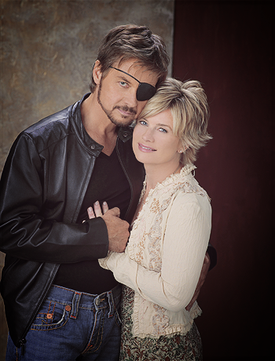
Steve "Patch" Earl Johnson and Dr. Kayla Caroline Brady are a supercouple on the American soap opera Days of Our Lives. Steve is portrayed by Stephen Nichols and Kayla is portrayed by Mary Beth Evans. On internet message boards, the couple is often referred to by the portmanteau "Stayla". The couple was initially popular from 1986 through 1990 until the "death" of Steve. Both characters have since returned: after being presumed dead for 16 years, Steve returned to the show on June 9, 2006, and Kayla returned on June 12, 2006, before both departed again in February 2009. Kayla returned in December 2011. In August 2015, Steve returned to Salem, and the couple reunited soon after.

Musafir is a 1957 Hindi film directed by Hrishikesh Mukherjee, being his directorial debut. The screenplay and story were written by Hrishikesh Mukherjee and Ritwik Ghatak respectively. The film is about a house and the lives of three families who live in it, so in essence, it is three stories linked by the house. The first part stars Suchitra Sen, Shekhar in the lead role; The second part stars Kishore Kumar, Nirupa Roy, in the lead roles; The third part stars Dilip Kumar, Usha Kiran in the lead roles. The film was a profitable venture for Hrishikesh Mukherjee.

Homelessness or houselessness – also known as a state of being unhoused or unsheltered – is the condition of lacking stable, safe, and functional housing. The general category includes disparate situations, such as living on the streets, moving between temporary accommodation such as family or friends, living in boarding houses with no security of tenure, and people who leave their domiciles because of civil conflict and are refugees within their country.

Theresa McQueen is a fictional character from the British Channel 4 soap opera Hollyoaks, played by Jorgie Porter. She made her first appearance on 24 November 2008. The character was introduced as an extension of already established McQueen family and quickly became a fan favourite for her cute, bubbly personality and dark storylines. During her first five years on the show, Porter was featured in numerous high-profile storylines, including: underage sex; the murder of Calvin Valentine ; teenage pregnancy; being the target of serial killer Silas Blissett ; falling down a lift shaft; discovering her boyfriend, Ethan Scott was dating two other women and forming a friendship with the girls; finding her long-lost father; relationships with Dodger Savage, Will Savage and Joel Dexter ; and her arrest for Calvin's murder. Porter announced her departure from the soap in October 2013 so she could focus on Dancing on Ice. Her exit scenes aired on 9 January 2014.

The McQueen family is a fictional family in the Channel 4 soap opera Hollyoaks. The family first appeared in 2006 and the family have been involved in a number of the show's most high-profile storylines, most notably John Paul McQueen's affair with Craig Dean ; Jacqui McQueen's whirlwind relationship with Tony Hutchinson ; Myra McQueen's long-lost son Niall Rafferty's revenge on his family by holding them hostage in an abandoned church and blowing it up, ultimately killing his half-sister Tina Reilly ; Theresa McQueen's pregnancy by her cousin Carmel McQueen's fiancé Calvin Valentine and later shooting him dead on their wedding day; Mercedes McQueen's affair with her fiancé Riley Costello's father Carl ; being kidnapped by Riley's grandfather Silas Blissett, Jacqui coping with the death of her husband Rhys Ashworth in a bus crash, learning that he had been having an affair with Cindy Cunningham and that he got Sinead O'Connor pregnant; Mercedes stalking Mitzeee and stabbing herself and framing her; Carmel's facial disfigurement; Myra faking her own death to escape her daughter Mercedes' evil husband, Dr. Paul Browning ; Mercedes killing her husband Doctor Browning by striking him over the head with a shovel; John Paul's male rape at the hands of his pupil Finn O'Connor ; the train crash which ultimately killed Carmel; Mercedes faking her death to help Grace Black get revenge on Freddie Roscoe ; Theresa donating her kidney to Nico Blake ; Porsche and Cleo McQueen's sexual abuse at the hands of their mother Reenie McQueen's fiancé Pete Buchanan ; Phoebe McQueen's murder in hospital by the Gloved Hand Killer; the stillbirth of Mercedes' baby Gabriel; John Paul's transgender boss Sally St. Claire being revealed as his biological father, Mercedes being framed for drugs by Joanne Cardsley, Celine McQueen and Diego Salvador Martinez Hernandez De La Cruz's sham wedding for money; Celine being murdered by her ex-boyfriend and serial killer Cameron Campbell after discover he causes the fire at the fair on Halloween 2016; Hunter affair with his teacher Neeta Kaur, leads his feud with his fiance Mac Nightingale ; Prince marriage to Lily Drinkwell and Breda turning out to be a serial killer.
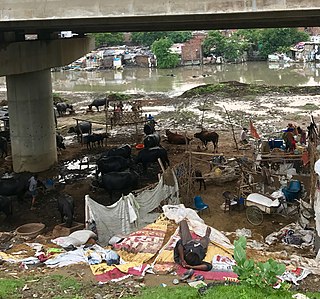
Homelessness is a major issue in India. The Universal Declaration of Human Rights defines 'homeless' as those who do not live in a regular residence. The United Nations Economic and Social Council Statement has a broader definition for homelessness; it defines homelessness as follows: ‘When we are talking about housing, we are not just talking about four walls and a roof. The right to adequate housing is about security of tenure, affordability, access to services and cultural adequacy. It is about protection from forced eviction and displacement, fighting homelessness, poverty and exclusion. India defines 'homeless' as those who do not live in Census houses, but rather stay on pavements, roadsides, railway platforms, staircases, temples, streets, in pipes, or other open spaces. There are 1.77 million homeless people in India, or 0.15% of the country's total population, according to the 2011 census consisting of single men, women, mothers, the elderly, and the disabled. However, it is argued that the numbers are far greater than accounted by the point in time method. For example, while the Census of 2011 counted 46,724 homeless individuals in Delhi, the Indo-Global Social Service Society counted them to be 88,410, and another organization called the Delhi Development Authority counted them to be 150,000. Furthermore, there is a high proportion of mentally ill and street children in the homeless population. There are 18 million street children in India, the largest number of any country in the world, with 11 million being urban. Finally, more than three million men and women are homeless in India's capital city of New Delhi; the same population in Canada would make up approximately 30 electoral districts. A family of four members has an average of five homeless generations in India.

Occupy Homes or Occupy Our Homes is part of the Occupy movement which attempts to prevent the foreclosure of people's homes. Protesters delay foreclosures by camping out on the foreclosed property. They also stage protests at the banks responsible for the ongoing foreclosure crisis, sometimes blocking their entrances. It has been compared to the direct action taken by people to prevent home foreclosures during the Great Depression in the United States.
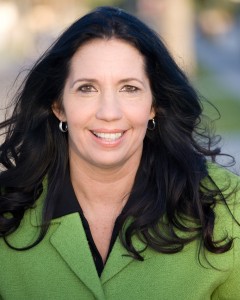
Cheri Lynn Honkala is an American anti-poverty advocate, co-founder of the Kensington Welfare Rights Union (KWRU) and co-founder and National Coordinator of the Poor People's Economic Human Rights Campaign, also called the Poor People’s Army. She has been a noted advocate for human rights in the United States and internationally. She is the mother of actor Mark Webber.

Family homelessness refers to a family unit who do not have access to long term accommodation due to various circumstances such as socioeconomic status, access to resources and relationship breakdowns. In some Western countries, such as the United States, family homelessness is a new form of poverty, and a fast growing group of the homelessness population. Some American researchers argue that family homelessness is the inevitable result of imbalanced “low-income housing ratio” where there are more low-income households than there are low-cost housing units. A study in 2018 projected a total of 56,342 family households were recognized as homeless. Roughly 16,390 of these people were living in a place not meant for human habitation. It is believed that homeless families make up about a third of the United States’ population, with generally women being the lead of the household.
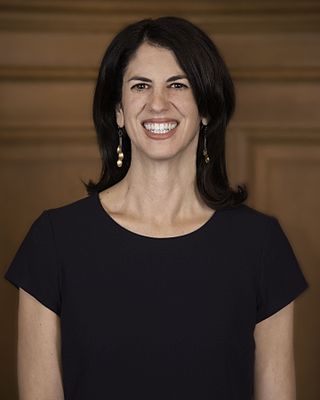
Hillary Ronen is an American politician and attorney serving as a member of the San Francisco Board of Supervisors from District 9, which includes the neighborhoods of Mission District, Bernal Heights, and Portola.
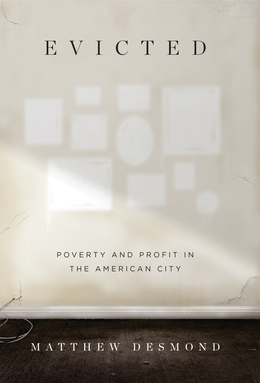
Evicted: Poverty and Profit in the American City is a 2016 nonfiction book by American sociologist Matthew Desmond. Set in the poorest areas of Milwaukee, Wisconsin during the 2007–2008 financial crisis and its immediate aftermath, the book follows eight families struggling to pay rent to their landlords, many of whom face eviction. Through a year of ethnographic fieldwork, Desmond's goal is to highlight the issues of extreme poverty, affordable housing, and economic exploitation in the United States.

Eviction in the United States refers to the pattern of tenant removal by landlords in the United States. In an eviction process, landlords forcibly remove tenants from their place of residence and reclaim the property. Landlords may decide to evict tenants who have failed to pay rent, violated lease terms, or possess an expired lease. Landlords may also choose not to renew a tenant's lease, however, this does not constitute an eviction. In the United States, eviction procedures, landlord rights, and tenant protections vary by state and locality. Historically, the United States has seen changes in domestic eviction rates during periods of major socio-political and economic turmoil—including the Great Depression, the 2008 Recession, and the COVID-19 pandemic. High eviction rates are driven by affordable housing shortages and rising housing costs. Across the United States, low-income and disadvantaged neighborhoods have disproportionately higher eviction rates. Certain demographics—including low income renters, Black and Hispanic renters, women, and people with children—are also at a greater risk of eviction. Additionally, eviction filings remain on renters' public records. This can make it more difficult for renters to access future housing, since most landlords will not rent to a tenant with a history of eviction. Eviction and housing instability are also linked to many negative health and life outcomes, including homelessness, poverty, and poor mental and physical health.

















